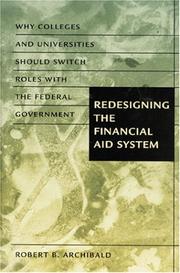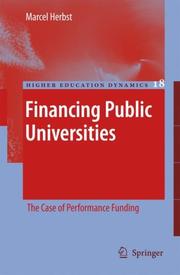| Listing 1 - 10 of 24 | << page >> |
Sort by
|
Book
ISBN: 187838001X Year: 1990 Publisher: Washington (D.C.): George Washington university. School of education and human development
Abstract | Keywords | Export | Availability | Bookmark
 Loading...
Loading...Choose an application
- Reference Manager
- EndNote
- RefWorks (Direct export to RefWorks)

ISBN: 0801877598 9780801877599 0801871239 9780801871238 Year: 2002 Publisher: Baltimore Johns Hopkins University Press
Abstract | Keywords | Export | Availability | Bookmark
 Loading...
Loading...Choose an application
- Reference Manager
- EndNote
- RefWorks (Direct export to RefWorks)
Archibald's clear explanation of the current system--its impact, strengths, and weaknesses--as well as his plans for reform, will be of interest to educators, administrators, students, and parents.
Book

ISBN: 142142083X 9781421420837 9781421420820 1421420821 Year: 2016 Publisher: Baltimore, Maryland
Abstract | Keywords | Export | Availability | Bookmark
 Loading...
Loading...Choose an application
- Reference Manager
- EndNote
- RefWorks (Direct export to RefWorks)
Ultimately, the authors recommend that states create new ways of helping colleges with many at-risk students, define performance indicators and measures better tailored to institutional missions, and improve the capacity of colleges to engage in organizational learning.
Government aid to higher education --- Education, Higher --- Universities and colleges --- Finance.
Year: 2018 Publisher: [Washington, D.C.] : Congressional Research Service,
Abstract | Keywords | Export | Availability | Bookmark
 Loading...
Loading...Choose an application
- Reference Manager
- EndNote
- RefWorks (Direct export to RefWorks)
Foster children --- Government aid to higher education --- Education (Higher) --- Services for
Book
Year: 2006 Publisher: [Washington, D.C.] : [U.S. Dept. of Education],
Abstract | Keywords | Export | Availability | Bookmark
 Loading...
Loading...Choose an application
- Reference Manager
- EndNote
- RefWorks (Direct export to RefWorks)
Education, Higher --- Government aid to higher education --- Higher education and state --- Finance.
Book
Year: 2008 Publisher: Santa Monica, CA : RAND Corporation,
Abstract | Keywords | Export | Availability | Bookmark
 Loading...
Loading...Choose an application
- Reference Manager
- EndNote
- RefWorks (Direct export to RefWorks)
In the late 1990s, the Korea Ministry of Education and Human Resources, in response to concern over the relatively low standing of the nation's universities and researchers, launched the Brain Korea 21 program BK21). BK21 seeks to make Korean research universities globally competitive and to produce more high-quality researchers in Korea. It provides fellowship funding to graduate students and professors in research groups at top Korean universities. Concentrating on the second phase of BK21, which will continue until 2012, the authors develop quantitative and qualitative models and methods to evaluate how well BK21 is fulfilling its goals, suggest a database of measures needed for that evaluation, and make suggestions for the future management of the program. The measurement methods proposed in this book can assess not only the progress of the BK21 program but also the health and development of the Korean university system as a whole. Korean university research could be stimulated further through a combination of competitive awards for project funding, portable fellowships for graduate students who would select their universities, and university access to capital for construction of first-rate research facilities.
Education, Higher --- Government aid to higher education --- Finance. --- Brain Korea 21 (Project) --- Evaluation.
Book
Year: 2004
Abstract | Keywords | Export | Availability | Bookmark
 Loading...
Loading...Choose an application
- Reference Manager
- EndNote
- RefWorks (Direct export to RefWorks)
Government aid to higher education --- Prepaid tuition plans --- Student aid --- Education, higher --- Study aids --- Education
Book
ISBN: 0253051479 0253051452 9780253051479 9780253051431 0253051436 9780253051448 0253051444 9780253051455 Year: 2020 Publisher: Bloomington
Abstract | Keywords | Export | Availability | Bookmark
 Loading...
Loading...Choose an application
- Reference Manager
- EndNote
- RefWorks (Direct export to RefWorks)
Almost 50 million Americans have cumulatively borrowed more than $1.5 trillion to attend college. Roughly one-third of all adults aged 25 to 34 have a student loan. In Education without Debt businessman and philanthropist Scott MacDonald examines the real-life impact of crushing levels of student debt on borrowers and what can be done to fix this crisis. Weaving together stories of debt-impaired lives with stories of personal success achieved with the essential help of financial aid, MacDonald reveals the devastating personal and societal impact of the debt problem and offers possible solutions. He explores the efforts of colleges and private philanthropists to make education affordable and relates his own experience of funding financial aid for need-eligible students at five universities. Education without Debt is a must-read book for anyone concerned about the rising cost of education and what to do about this critical policy and societal issue.
Government aid to higher education --- Education, Higher --- Student loans --- College costs --- Finance. --- United States.

ISBN: 9786610901968 1402055609 1402055595 9781402055591 Year: 2007 Volume: v. 18 Publisher: Dordrecht : Springer,
Abstract | Keywords | Export | Availability | Bookmark
 Loading...
Loading...Choose an application
- Reference Manager
- EndNote
- RefWorks (Direct export to RefWorks)
"Financing Public Universities" addresses newer practices of resource allocation which tie funding to indicators of performance. The gist of these efforts is to raise the quality of institutional systems. Performance-based budgeting and funding of public universities is part of broader efforts to reform public management, and it is being promoted and implemented by various government agencies around the globe. In particular, European universities with their normally strong governmental ties, or higher education systems molded on European universities, are prime targets of such reforms. Performance funding has made its inroads in attempts to grant university systems managerial autonomy: autonomy was to be granted in exchange for funding modes which are tied to the measurement of performance indicators. Unfortunately, performance-based budgeting or funding measures cannot meet the various expectations: they do not raise the quality of teaching or learning; they do not raise research performance; they take back a great deal of managerial autonomy which is commonly judged to be essential for the well being of higher education institutions, in particular research universities; and they act as automata in place of proper governance and management. "Financing Public Universities" addresses policy makers, higher education administrators, scholars and students of higher education management. After an introduction to the theme and to the book (Chapter 1), "Financing Public Universities" covers the evolvement of mass higher education and the associated curtailment of funding (Chapter 2), the public management reform debate (Chapter 3) within which performance-based budgeting or funding evolved (Chapter 4), sketches alternative governance and management modes which can be used instead (Chapter 5), and epitomizes inertia or challenges (Chapter 6). Four appendices cover more technical matters, such as a comparative exposition of the research performance of universities by nation (Appendix C) and examples of funding systems in the UK and in the USA (Appendix D). The author of this book is a former university administrator who finally became a researcher. This unusual background provides the author with a special understanding of university management but also, as a privileged observer, with a profound insight on university life. (.......) This book is a basic tool for understanding universities in a period of reforms and transformations. Jose-Gines Mora, Technical University of Valencia, President of the EAIR The present compendium by Marcel Herbst is of great help for all those who are involved in reflecting about and shaping the future of higher education and research. The reader will find an abundance of information and many comparisons of existing systems as well as suggestions for future developments. The author offers the reader not only a description of the actual situation. The reader will also find a wealth of challenging personal views which may help his of her own process of reflection. Jakob Nuesch, President emeritus, Swiss Federal Institute of Technology in Zurich (ETH Zurich).
Universities and colleges --- Government aid to higher education. --- Finance. --- Education, Higher --- State aid to higher education --- Government aid --- Finance --- 378.6 --- 378.6 Interuniversitaire instituten --(algemeen) --- Interuniversitaire instituten --(algemeen) --- Government aid to higher education
Book
Year: 2006
Abstract | Keywords | Export | Availability | Bookmark
 Loading...
Loading...Choose an application
- Reference Manager
- EndNote
- RefWorks (Direct export to RefWorks)
Engineering --- Government aid to higher education --- Higher education and state --- Mathematics --- Science --- Study and teaching (Higher) --- Technology & engineering --- Education
| Listing 1 - 10 of 24 | << page >> |
Sort by
|

 Search
Search Feedback
Feedback About UniCat
About UniCat  Help
Help News
News